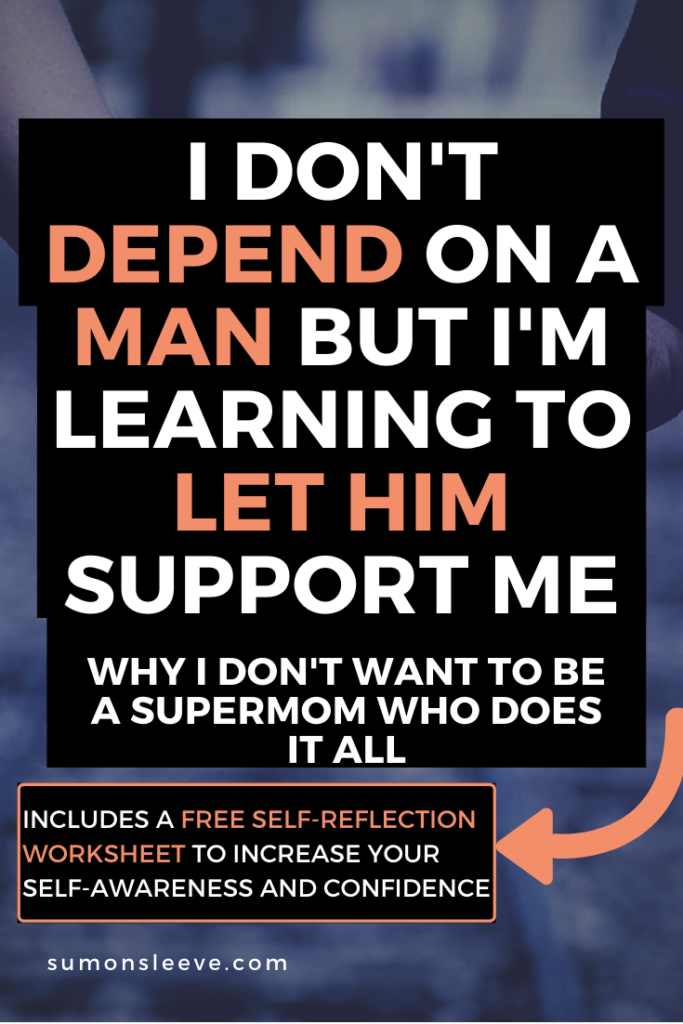As a feminist, I grew up defying gender stereotypes. I never want to depend on a man. However, since becoming a mom, I've realized letting him help me is just as important as helping him.

I don’t depend on a man but I’m learning to let him support me
I can’t do everything even if I want to
Who makes more money in your household?
You or your partner?
Does it matter? Do you care? Does your partner care?
Why do you care? Why do they care?
Is it because you are a woman? Is it because you are a man?
Is it because he’s a man? Is it because she’s a woman?
My mom wanted the best for us
It’s the mid-90’s and I’m storming out of my piano lesson like a disgruntled employee who just received her last warning. My teacher figured out I hadn’t really practiced 3 times that week. I’m an embarrassed, angsty, disappointed 10-year-old. I open my mom’s Hyundai, slump into my seat and slam the door. My mom asks,
“What’s wrong?”
I muffle,
“I don’t want to do piano anymore.”
She sighs and starts the car,
“Okay…but think about it first.
I’ve always told you and your sisters that what you learn is for you to keep. No one can take that away from you. I’m putting my entire paycheque into all your extracurricular activities because I want you to learn as much as you can so you don’t need to depend on anyone.”
I nod, sheepishly staring at the piano book in my lap and holding back a few angry tears. She continues,
“The more you learn, the more educated you become, and the more money you can make so you can take care of yourself. I don’t want you to be in my position when you get married.”
I look up at her. She’s staring at the red traffic light. She takes a deep breath in,
“I didn’t get the opportunities that you have growing up in Canada. I had to finish my secondary education at night school while I worked during the day. I can’t make as much as your dad; he takes care of the finances. I have to depend on him but you don’t have to.”
We arrive at home. My mom turns off the engine. She looks back at me. I look at her,
“Yeah I know, mom. I’ll actually practice this week.”
Her words stuck to me like an invisible leech
And I didn’t quit. I kept practicing piano throughout high school, winning trophies at competitions and finishing all exams with flying colours. I kept going to Chinese school, doing my dictation tests, reciting poems, writing essays, completing exams.
My thirst for knowledge was fed by my mom’s words. I needed to take advantage of the opportunities she didn’t have, to make the sacrifices my immigrant parent made worth it, to be the better generation, to be self-sufficient, and lastly, to never depend on a man.
I continued my education, earning scholarships, finishing my Bachelor’s degree, then my Masters while working multiple part-time jobs to save a downpayment for my own place.
And then I was working full-time, making a decent salary, living in my 2 bedroom condo, collecting rent from my roomie, paying off my mortgage and bills like a strong independent woman.
I am a feminist, a modern woman. Hear me roar. Nothing can stop me and no one will. I can do anything and everything. My mom’s words stuck with me like an invisible leech; I believed in defying gender stereotypes, breaking down barriers that would make my female ancestors proud.
I do not need a man to open a tight jar. I lift heavy weights and do pull-ups at the gym so I have the strong forearms to do that.
I do not need a man to pay for me. I studied and worked hard to have a well-paying job that will do that.
I don’t need a man to figure out my finances. I am English proficient, good with numbers, excelled at math and have the money management skills to do that.
I do not need a man to fix my toilet. I’m proactive, self-sufficient and resourceful. I can look it up on YouTube, buy the necessary tools with my hard earned cash and fix it myself.
I don’t need a man to negotiate my phone contract, Internet bill, car purchase, home repair costs etc. I have the communication and language skills after years of working in a corporate environment to do that myself.
I do not need a man. I do not depend on him because I can take care of myself.
These were my 20’s and I was living the dream, making my own money, climbing the corporate ladder.
Marriage changes some things but not everything
In my late 20’s, I ended an 8-year long relationship with a man who didn’t want to get married (to me). That relationship taught me so much about myself and how I am as a partner, my strengths and weaknesses, how I deal with anger, how my over-functioning is actually a fault, what values I am not willing to bend on, how being with someone doesn’t define me, that it’s only a part of who I am.
So I knew what I needed, wanted and deserved in a life partner and I met him shortly after. We got married a couple of years later. We sold our own condos and bought a house together. We split our bills 50:50. We kept our individual bank accounts and not much changed for us; everything seemed to be smooth sailing.
I continued to thrive in my career, pulling in a respectable income, saving for retirement and putting some in investments. He continued consulting, landing clients and travelling a bit for his gigs.
There was no breadwinner
We made roughly the same but it was difficult to compare. He owned a small business whereas I worked for an employer. I had vacation and sick days but he had tax write-offs and could decide how much he wanted to pay himself.
Neither one of us was the ‘breadwinner’, a ‘meal ticket” or the one who ‘brought home the bacon’; we were both raking it in, as equal partners, financially contributing to the household, chipping away at our mortgage and paying the bills together. It was a team effort.
We both do things around the house because that’s how we grew up
We’re all too familiar with the following storyline (I think this was concocted by some male chauvinistic TV producers in the 1990’s)
A husband leaves his shit around the house and the wife has to pick up after him. He’s a slob (usually overweight) and she’s basically his mother (typically good looking, lean and fit, Type A).
The wife nags him; he gets in trouble so he does one chore and gets rewarded by the wife (usually sex) like a fucking dog.
The cycle starts again in the next episode.
***Cue laugh track**
This might be one of those plots that only rich white people can relate to because growing up as a Chinese Canadian, I always saw both my parents cleaning. They shared the housework because they both had to work. Survival was the main priority for immigrant parents, not bickering about who left a pair of socks on the floor.
My dad’s nickname was Mr. Clean/OCD. He has a place for everything and when something’s been misplaced, he needs to put it back in its place. He vacuumed all the time, dried and put away dishes, swept the floors, wiped counters constantly, folded laundry, took out the garbage and did all the yard work. My mom cooked, washed dishes, had a schedule of when she mopped, did the laundry, cleaned the toilets and scrubbed the tubs. The one thing that they did together was changing the bedsheets.
My husband’s parents were very similar. He often tells me the story of how his dad vacuumed up one of his toys and he got so mad at him. But upon reflecting, he now realizes his dad was just doing his job and he really shouldn’t have left his toys lying around if he didn’t want them sucked up.
So lazy husband and anal wife are not us. We divided our household chores depending on who cared more and who was better at it. I don’t pick up after him. He doesn’t pick up after me. We’re both responsible adults who used to live apart, in their own space. Now, we’re taking care of our own messes in a shared space.
We were just 2 working professionals, in love, living together…ready to expand our family.
I thought I could have my cake and eat it too
Before kids, I thought I could do it all, have an amazing career, be an amazing mom, have an amazing marriage, have amazing friends, be constantly happy and fulfilled, never miss a deadline, never miss my kid’s soccer game, play, performance…because I can and I will. Because I’m going to be Supermom.
I seriously pictured myself in a power suit with an invisible cape, dropping off the kids at school with my coffee thermos in hand, heading to a meeting with a bunch of corporate bigshots, coming home, throwing together a crazy fancy dinner, going for an evening run before kissing the kids goodnight and reading them bedtime stories, then, winding down with the hubby for sexy time.
And everything would be perfect, just like that.
I thought juggling work and motherhood would be simple and easy because I assumed my husband would do an equal share in childcare duties. I had an expectation that everything would be split in half, just like our finances and household chores. We would do it as a team as that’s how we tackled everything else, no resentment, no keeping score, just doing our parts together.
Having kids changed us…for better or worse
I was wrong and naive because I didn’t factor in our differences in values around parenting and how that affected what we prioritized given our time had become a hot commodity.
We could no longer split things down the middle because we don’t have the same amount of time to do the things we want or need to. Responsibilities changed as taking care of a baby took precedence; everything else had to be reshuffled. And that “everything else” was literally everything from household chores, self-care, career, hobbies, to social events…
You can’t ignore a screaming, hungry baby like you can a phone call or text.
You can’t put your 4-year old on hold or reschedule her tantrum to another day.
You can’t put a baby’s dirty diaper on the backburner and postpone it for next quarter.
You can’t just leave your house to run an errand, see a friend, grab a coffee without making sure someone can watch your kids.
You can’t press pause or ‘save as draft’ on those parenting moments, those memories, that time when your daughter asks you why daddy pees standing up. They come and they go because kids are living, breathing, organic human beings.
Becoming parents made us realize what was important to us, not just the big life-changing stuff (like family first or caring less about what others think), but the day-to-day things. It’s logical to put the things that matter at the top of a to-do list; however, my husband and I had a different way of prioritizing them.
And this difference has forced me to hang up my ego, swallow my pride, and accept a truth that I didn’t want to believe.
I can’t do it all and I need him to help me.
It’s okay that we fit some gender stereotypes
As a kid, I’ve always been the one to say, “I can do anything a boy can do.” I believed in what the Spice Girls’ preached about “Girl Power”. Coupled with my mom’s words, it became a mission for me to defy gender stereotypes (as well as Asian ones).
But becoming a mother has made me realize there are some things I do and care about that meet the female stereotype. And there are some things my husband does and cares about that meet the male stereotype. It’s okay that we fit these gender roles because that’s what makes our marriage work and allows our kids to thrive in a happy and healthy home.
Just because you can doesn’t mean you should
However, for a long time, I didn’t want to accept it; I fought it hard by trying to have a hand in everything. I remember I was 4 months pregnant with our son when I told my husband I wanted to shovel compost for our garden. He didn’t question me because he knew I would give him an earful about how he can’t tell me what I can or cannot do.
So he handed me a shovel and off I went. My husband and daughter watched me from the kitchen window as I slowly trudged back and forth, carrying small bits of soil without having to stop and sit down. It took a long time and I was tired; my back and arms were sore for days but I managed to use all the dirt, evenly spread out across our yard.
Was it worth it? Or should I have let him do it in half the time?
I’m not in my mother’s position
When did defying gender roles become denying who I am?
I needed to stop denying who I was just because I didn’t want to fit a certain gender role. I am a woman. I can have feminine traits. I can be nurturing, soft and emotional. I can have domestic behaviours. I can be the one who cooks, cleans, takes care of the children. And I can prefer to do some of those duties over masculine ones such as yard work, fixing the car, home repairs.
And as a feminist, it’s about having the choice to choose how I want to define my role as a mother and wife, not what society expects me to. I can be a woman who doesn’t depend on a man and still be the same woman who needs his help.
I am not in my mother’s position. The social and cultural landscape has changed. I am not raising my kids during a time when women were expected to stay at home. I am not married to a man who is more educated than me or has the potential to earn more money than me. Money is not the reason why I need my husband and needing him does not mean I depend on him. There is no power dynamic between us because we need each other.
His efforts are equally important as mine (and vice versa)
Managing a family of 4 is a lot of work. It’s busy, chaotic and neverending. It requires effective and constant communication, a great deal of trust, accountability, and grit between us to keep it above water.
And most importantly, we need to appreciate what the other can offer, that every effort is equally significant as it contributes to our overall family’s wellbeing. Because my husband and I prioritize things differently, my efforts may not seem as important to him as it does to me and his efforts may not seem as important to me as it does to him.
I care more than him about being present with my kids, sitting down and taking the time to teach them skills that my parents couldn’t teach me (like managing strong feelings or having difficult conversations), talking about things they couldn’t talk to me about. I value building a strong authentic connection with them, empowering them to feel confident in the decisions they make. I worry more than him about how they’ll turn out, whether they’ll have enough emotional and mental resilience to deal with what life throws at them.
It’s not like he doesn’t care or worry about these things; there are different things that occupy his mind that do not occupy mine because we grew up differently.
He cares more than me about providing financially for the kids, allowing them to have things, opportunities and experiences that his parents couldn’t afford for him. He wants to open doors for his kids that were closed for him when he was growing up. He cares about ensuring we are prepared decades down the road so that we can retire without worrying about having enough to live off of. He worries more than me about paying down our mortgage, what our investments will look like in the future, how he can expand his business, creating generational wealth so that he can leave a legacy for his kids.
Although we care about different things, we both want our kids to have a better childhood than the ones we had. We both care about providing a happy and healthy home for our kids to grow up in and that means having a happy and healthy marriage.
If I had the same expectations for myself as I do for him, I would live in perpetual disappointment and resentment. So I’ve learned (still learning) to empathize, seeing what’s important to him and appreciating the contributions he makes for the family.
The effort he puts into building the gate for our yard means he’s contributing to our family’s security and safety.
The effort he puts into ensuring our rental properpty has an appropriate tenant means he’s contributing to our family’s financial goals.
The effort he puts into renovating our kitchen means he’s contributing to our family’s living situation.
And he’s learned (still learning) to empathize, seeing what’s important to me and appreciating the contributions I make for the family.
The effort I put into talking to my neighbour and reminding him about his smoking means I’m contributing to our family’s health and safety.
The effort I put into cooking meals and having dinner at home instead of going out means I’m contributing to our family’s nutrition and helping us save money.
The effort I put into taking the kids to the playground and going on walks means I’m contributing to our family’s physical and mental health.
Each of us has 24 hours to dedicate to what needs to be done. How we delegate these efforts required us to remove our egos and focus solely on the mission of having a healthy and happy family rather than the nuances of who is being stereotyped and what we thought was more important.
On days where I am exhausted, stretched beyond my limits, and I see him taking an extra minute to check his phone to see if his client responded instead of getting the table ready for dinner, I take a deep breath and wait. I remind myself that we are both functioning with our hearts and minds at maximum capacity. We’re both doing the best we can and letting him support me is just as important as supporting him.





